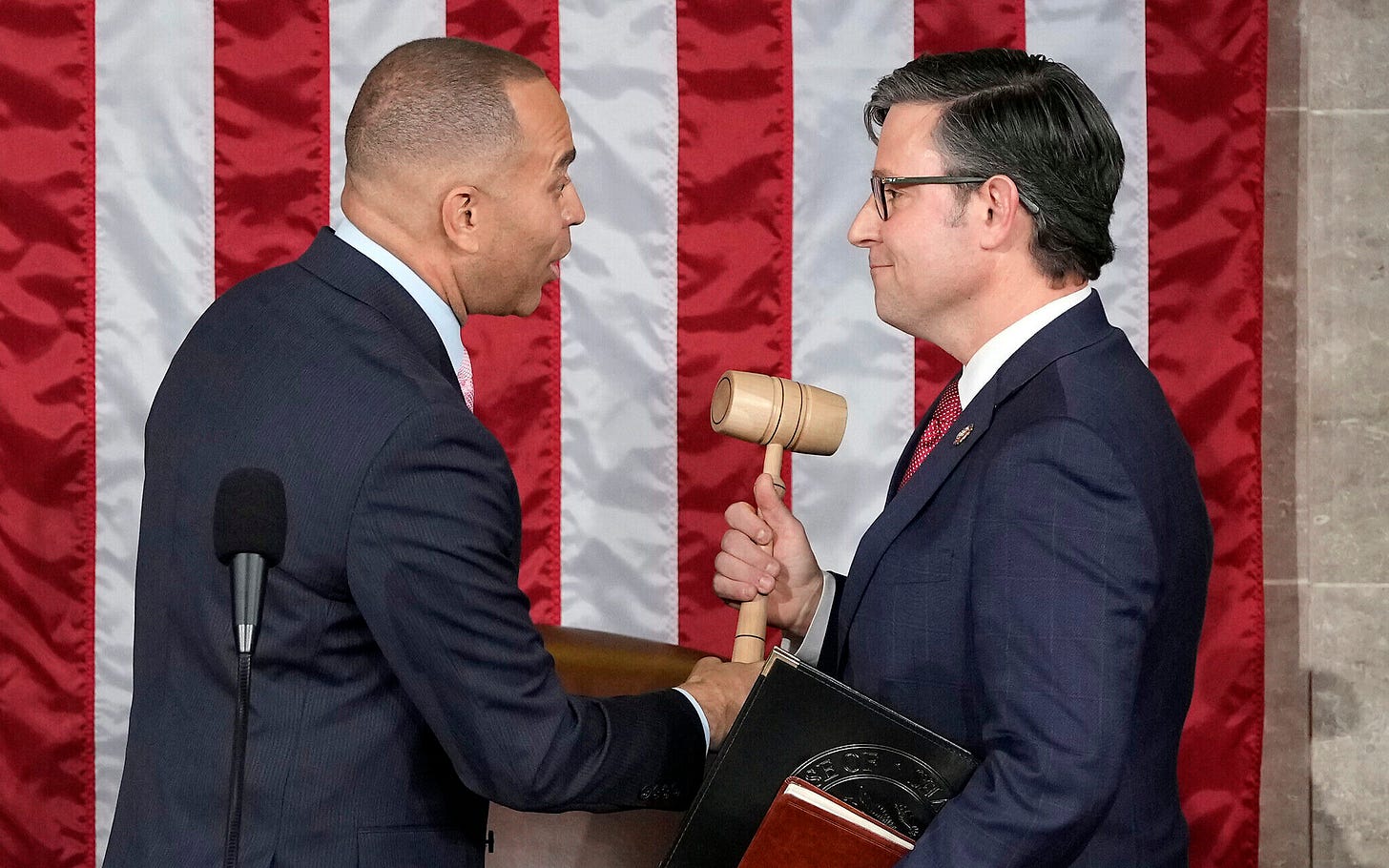A contentious election cycle, in a leap year? Does nobody ever get bored of this?

Welcome back to the petestarkcore Substack! After a six week or so hiatus I am back and better than ever - ready to deliver election analysis and commentary to the fullest extent which I feel qualified to do.
This article will focus on the United States, and the upcoming Congressional, Senatorial and, of course, Presidential elections coming our way in November. Included within will be a concise explanation of where we find ourselves eleven months out from November, and a brief prediction of what is likely to pan out. A future article will also feature a global election calendar, and a look at the potential results of a likely general election in the United Kingdom - which some are claiming will occur just one week after election day in America.
Without further ado, let us strap in and see what election results the year of our lord 2024 is likely to deliver us.
House of Congress (Leans Democratic)

The House of Congress will potentially be the most competitive chamber in this year’s elections and, as of right now, I am rating it as leaning Democratic. The route to control of the House will likely run through historically friendly seats in New York and California, which the Democrats lost in 2022 but will likely return to their column this year. On top of this, candidate quality, spending woes, and the inaction of the 118th Congress may well be a perfect blue storm which I believe will culminate in Democratic control of the House, even if Pres. Biden struggles at the top of the ticket.
Perhaps the biggest boon for Democrats is candidate quality, as this was a massive pitfall for Republicans in 2022 and I see no evidence that they are changing course as the 2024 primary season begins. Toxic candidates such as J.R. Majewski in Trump leaning OH-09 or Sarah Palin in Alaska’s sole congressional district cost the GOP at least two seats last cycle and while the latter is out of the running, the former is still running and may well cost his party Ohio’s northernmost seat to Rep. Kaptur once again. Democrats, on the other hand, have a far better track record with candidates like now-incumbent Reps. Peltola (D-AK) or Guisenkamp-Perez (D-WA) massively outperforming Biden to win seats that they had no right to win in 2022. The GOP is short of such overperformers in competitive districts - aside from in California where down ballot Republicans still enjoy significant support compared to their statewide counterparts, or unique cases such as Rep. Bacon in Nebraska’s second Congressional district. Yet it is reckless to assume that the Republican party can still rely on these voter tendencies and, even if they hold, it may not matter if Democrats can pitch stronger candidates across the board in a vast majority of swing seats anyways - which I have no reason to believe they won’t. This is the first notch in favour of the Democrats, and is the one I am most confident in as the year kicks off.
The second biggest plus-side for Democrats is spending, as the DCCC is currently outraising the NRCC since major fundraisers like former Rep. McCarthy and Rep. Scalise have taken less of a lead and given the reins to the broadly inexperienced hands of Speaker Johnson. Of note in October, when Johnson took the Speaker’s gavel, the GOP reported just $5 million in raised funds compared to a figure over double that in the previous two off-year election cycles. This was also notably less than the $8 million raised by Congressional Democrats in the same month. While Republicans still have a healthy warchest as of right now, it remains to be seen whether or not it will be enough to hold control of the house come November as, if the GOP is outspent across the board, this will obviously seriously harm their chances of retaining control. Obviously, this is fairly speculative but with major NRCC fundraising figures out of the picture, it doesn’t seem unreasonable to assume that sustained fundraising issues are sure to follow. Should this trend continue, this is a second notch in favour of the Democrats.
Rounding up Republican woes is the inaction of the 118th Congress and why this Congress has been so ineffective. For those unclear, Republican House leadership needs to do no more than look in a mirror to realise why the House has a less than 10% approval rating, and why the median voter believes that Congress as a whole gets nothing done. Republicans in the House have spent a good third of this current term infighting, destroying each other and nearly grinding the economy to a halt more than once. From the initial Speaker debacle back in January, to McCarthy’s ouster at the start of Autumn, there has been very little time for any legislating to be done which is why this congress is currently on track to be the least productive in a generation. Therefore, it isn’t much of a sretch to go out on a limb and suggest that a “do-nothing” congress is going to be a soft target for Democratic attack ads. Thanks to this, the ineffectiveness of this incarnation of the House will be a building block for the Democratic majority and even a rallying point for President Biden as he runs for re-election. You only need to look towards Truman’s re-election to see how salient a message, “Congress gets nothing done,” truly is. As such, it is fair to say that the antics of the House majority and broader dysfunction will serve only as a crutch for Democrats and solidify their chances of flipping control of the chamber.
Senate (Leans Republican)

In a vacuum, the 2024 Senate elections comfortably favour the GOP, but this is politics post-2016 where nothing makes sense and anything can happen. In this spirit, I am unwilling to rate overall control of the Senate as anything safer than leans towards either Party. Especially as the possibility of a 50-50 Senate is on the cards once more, and the outcome of that would be contingent on the Presidential election. But please make no mistake and assume that Republicans shouldn’t be heavily favoured in the Senate. They absolutely should be, but due to gross incompetence inside the GOP I am unable to give them a bigger edge than I have.
Overall control of the Senate will likely be contingent on incumbency, the national environment and candidate strength, and I will discuss the ways in which these are likely to pan out below - most notably how they may help Democratic candidates in races they should have little hope of winning.
As aforementioned, incumbency is perhaps the Democrats’ biggest asset heading into 2024 with Senators’ Sherrod Brown of Ohio and Jon Tester of Montana being an excellent boon to their chances in unfriendly territory for Democrats - as the eventual GOP presidential nominee will be expected to carry both states handily. Across a number of swing states, the Democrats also have strong incumbents such as Sens. Rosen of Nevada, Casey of Pennsylvania, Baldwin of Wisconsin and Klobuchar of Minnesota. These are the result of an incredibly successful midterm six years ago in 2018 and that election may be pivotal to maintaining control of the Senate this year. Some of the Democrats up for election this year are uniquely strong with, for instance, Montana’s seven-fingered Senator Jon Tester performing eleven points better than a generic Democrat would be expected to do, or Pennsylvania’s Casey overperforming by three points by the same metric. Strong performances like these will be essential for Democratic control of the Senate this year, and nothing short of this will suffice.
Conversely, by some definitions, the Republicans have no swing state Senators up for election this year, so all the GOP needs to flip control of the Senate is to win in states which they should be within striking distance of anyway. Because of this, the Democrats have no real wiggle room. They are already expected to lose the seat of retiring Sen. Manchin in ruby red West Virginia and the two closest races which Democrats may hope to flip are Florida and Texas, which still lean towards the GOP by a not-insignificant margin. Other Democratic retirements such as Sen. Stabenow of Michigan or Kyrsten Sinema’s (I-AZ) decision to run as an independent have also opened the doors to Republican efforts to flip Democratic held seats through loss of incumbency. Even as solid Democratic successors (Rep. Slotkin in Michigan and Rep. Gallego in Arizona) have stepped to the plate and are presumptive nominees, they will lack the incumbency factors of the departing Senators and will have more work to do to convince voters of their credentials. For now, while incumbency will favour Democrats on the whole, it isn’t a solution on its own and can only go so far in maintaining control of the upper chamber of Congress. The lack of pickup opportunities for Democrats compounds this issue, and any loss on top of the presumed loss of West Virginia will hand control of the Senate to the GOP.
The final factor for Senate control is the national environment which, in the current hyper-partisan era, will be closely correlated with down ballot races and especially the Senate. Put simply, if Pres. Biden loses a state by five points, one should expect the Democrat running for Senate to lose by a similar margin - which may be the death knell for the Democrats’ chances of control this November. There will obviously be some exceptions going each way, but aside from the aforementioned Tester I can’t see too many Democrat incumbents who I’d expect to do ten or more points better than Biden. With this in mind, it will be helpful for us to segue into the Presidential election, as I expect this to correlate significantly with the final results of the Senate.
Presidency (Leans Democratic)

If you’d asked me as late as October just passed, I would have told you that Biden is almost certain to win the 2024 election, but as the year begins I am much less confident in this call. His fair approval ratings have been declining while Trump appears to be rehabilitating himself in the eyes of American voters for reasons unknown to me. And, as of right now, polling suggests that Trump is the favourite by a considerable margin in both a number of swing states and in national polling. But is the situation really as perilous as polls currently suggest? I’m unconvinced and will explain my rationale below.
At this point in his presidency, Biden is a uniquely weak incumbent with approval numbers worse than any of his predecessors this far into his first term, but approvals aren’t static and the mood of the median voter seems to flip on a dime. As such, I’m unwilling to put a lot of stead into this metric eleven months out from election day, as this forecast is attempting to predict what will happen then and not what would happen if the election happened today. The other reason I can’t bring myself to rely on approval ratings is because of why voters are souring on the incumbent. Simply put, voters are deeply concerned about Biden’s age - although they had these same concerns in 2020 also. Yet very few Americans are clued in enough to have substantive policy disagreements with him that they wouldn’t have with the Democratic party at large as he is, politically, emblematic of the median Democrat.
Conversely, Donald Trump faces similar questions of age and heightened questions around his health. While the incumbent president looks in good shape and has never been particularly over or under weight, his Republican challenger doesn’t look physically well. Weight has always been a soft spot for Trump and the average voter associates larger individuals with being more susceptible to health issues. As the campaign season clicks into gear and the public see more and more of both men I think there is a good chance that the health question becomes a sore spot for Trump more than Biden. Previously, Trump benefited too from being a better orator than Biden, being less gaffe-prone but the 2024 campaign has seen gaffe after gaffe from the indicted former President, including a recent unprompted rant about how magnets don’t work. If this trend continues, then the Conservative arguments surrounding Biden’s cognitive decline may well be nullified by November.
Trump suffers from political branding in a way which any other Republican likely wouldn’t due to the fact he has carved out his very own, far right flank of the GOP which has transformed the party in a way Biden couldn’t do to the Democratic Party. Very few floating voters are likely to be won over by his rhetoric and, unlike Biden, Trump has to unite Republican voters in a serious way after fracturing the party eight long years ago. This is why I see Trump’s rising approvals as somewhat of a mirage, since he is weaker than a generic Republican would be and his policy positions are downright bizarre but the average voter isn’t paying attention to them yet. By November, nearly a billion dollars will have been spent on making sure that each household in America has seen the former President’s policies, which is why I suspect Biden will have the edge by then.
The biggest question then is the route each candidate will take to win the electoral college, as winning the popular vote is one thing but it doesn’t dictate the winner of the election. Historically, the electoral college has been a boon for Republicans, but 2024 may well see a reversal of that fate as the Democratic party has been gaining in support in critical states while losing support where it doesn’t matter. For instance, 2022 saw Democrats falter in California and New York, which had consequences congressionally yet it wasn’t significant enough for any Democrat to lose a statewide election. Conversely, the Democrats ran the gauntlet in the smaller, swingier states of Georgia, Nevada, Arizona, Pennsylvania and much of the Midwest - all states which will be in play come November. This has, at least in part, been a result of Democrats building up strong State Party networks while GOP state parties have been run into the ground by inexperienced, populist leadership brought in thanks to the post-Trump era.
Perhaps nowhere highlights the discrepancy between GOP and Democratic state parties better than the Wolverine State. The Michigan Republican Party is currently fighting an internal lawsuit over who should take leadership of the party, and a report last month suggests that they are on the brink of bankruptcy too. Their Democratic counterpart however is flush with cash, and in 2022 won the governorship by double points along with every other statewide office and flipping control of both chambers of the State House. By every metric they are a shining example of how to run a State Party and will be a natural asset to the Biden campaign, DCCC and DSCC thanks to the state’s coinciding Senatorial election and its three swing districts in the House. It is operations like these where swing state Democratic parties massively outclass their conservative rivals that could well be the difference come November. This extensive groundwork allows Democrats to lose ground in friendly territory suffice that they can build it up in swing states for the possibility of a Democratic popular vote loss but electoral college victory.
Ultimately, the clash between Trump and Biden will be bitter, fiercely contested and down to the wire. I’ve chosen not to muse on a potential Trump conviction as such a scenario would have to be specifically analysed and is out of the bounds of this analysis given that it contradicts with any prior assumptions one could make of the election. It is, however, safe to say that a Trump conviction would theoretically render him a complete liability and almost completely out of the running, but that bridge shall be crossed if/when it becomes a reality. Until then, the picture is of Biden as a favourite, but a Trump within touching distance - which should be setting off major alarm bells in the DNC.
Wrapping Up
To summarise, 2024 is going to be one of the most contentious election cycles of the 21st century and the eventual victor will likely have the tightest margins of control in both Houses of Congress, while the President will likely have been elected by the skin of his teeth. But that isn’t what you want to hear. Instead, having looked closely at the state of play this far out, I feel confident enough to say that the Democrats should expect a good year, but that the Senate is likely out of their reach for the time being. Nothing is set in stone, but as of right now I would rather be sitting in the DNC than the RNC if I was looking for good news.
As always, let me know what you think about this analysis, where you think I may be wrong and thank you greatly for reading!







Glad to have you back! I’m bracing for this election. My nerves are already shot after all the years of Trump trauma, but it’s not like there’s a way to escape. Women’s lives as humans (rather than livestock) depend on this election.
Are polls dependable? I keep asking myself and other people this. Do people really answer unknown numbers? I don’t, but I guess maybe other people do? Or are the only people being polled lonely white retirees who are at home during the day and love the opportunity to share their opinion? Thoughts, anyone?